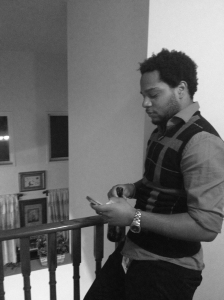
Why do we still have Black History Month?
And if anything why do we need a full month?? Let alone the coldest month of the year. Find me one Black community that celebrates winter. No seriously, I’d actually love to know.
At this point I feel we need to change this to some type of world heritage celebration. We’re all from somewhere and our stories and contributions are what have built the nations we call home today.
Yes, Blacks have been through quite a bit, but so have Jewish people, First Nations groups all over the world, and for Canadian history, East Asians should be given a whole freakin’ season.
For the more recent dissensions surrounding the Middle East, these are a people whose forefathers brought us everything from universities and hospitals, soap, and most importantly for this site, coffee! Over the course of history, they’ve certainly faced their own share of persecution.
Shout out to all my white people too. As great as living off the land and being one with nature is, I think we all like living in a country with heated homes and clean, running water. Albeit provocative, it’s interesting to think about where the world would be in 2013 had the troubles of colonial times not taken place.
By no means is our world perfect today, but I think we should acknowledge all of our cultural stories, and work together to all do better.
…Kumbaya









Colin, I couldn’t agree more. I come from a family where, growing up, I spent a lot of time in the South. And a lot of time in the South, meant a lot of history. My immediate family is European, but on both sides, I have Black relatives. Learning about the Civil War, Lincoln’s movements, civil rights movements, etc. was something my parents implemented in my lifestyle from the moment I started walking. I went to every museum, read every book, heard many stories and I fell in love with my knowledge, my understanding, my passion about certain issues. Unfortunately, unless you experience things that we wouldn’t normally (in our selfish futuristic world), we have no way of bettering ourselves & our future by understanding each other. What I’m getting at is – “history months” are great in the sense that they are bringing awareness/compassion/knowledge to people who didn’t have the privilege of otherwise being educated on the hardships people faced to fight for their rights and OURS. However – and it’s a big one – there is so much racism breeding in Canada with a) the endless amount of new Canadians immigrating and b) ignorance. Canadian schools focus on Canadian history, as they should. But where are the people to teach the generations now and to follow about their ancestors and exactly who brought what here for our benefit/future. How can we be expected to love and embrace each other/ work together/build a future in this ever-growing country if we aren’t appreciating or “getting to know” everybody?
On the flip side – every race has faced horrid pasts. I have stories from my grandfather in Hungary that would devastate anyone. Murder. Rape. Hate. Racism. We should educate to move forward and learn from past mistakes – not dwell on the racism that those mistakes can and have bred.
Wow, great addition.
I think with the world being so global, you kinda realize there’s no true “Canadian” history is there? Canada’s history is built on waves upon waves of immigration from all over the world. When you start looking into WHY those people chose to leave their homes and come here, you get this amazing quilt of stories that come to make us what we are. And as you said, there are lessons we can learn from all of it.
But you’re absolutely right, just because there’s diversity here, doesn’t mean there’s always acceptance. I think it’s coming though, slowly but surely as us younger generations come up.
I disagree.
There is true “Canadian” history, and our history is not built on waves upon waves of immigration. Our population and demographics have been shaped by waves of immigration while Canadian history has been largely authored by European-Canadians and their contributions therein.
While I appreciate the rosy view of immigration expressed here I think there’s a glaring oversight of Canadian history. That is that Canada’s history of immigration has largely been racist.
Two factors determined Canadian immigration until 1967 and the advent of the points system. 1) National country of origin. 2) Labour market needs. Prior to 67′ unless the economy warranted individuals from other countries Canada could refuse you on the basis of where you were coming from. The labour market also dictated whether or not you could enter the country. Look at the Chinese Head Tax and the fees for Chinese immigrants post-railroad construction. The fees went up because the work was done and the government didn’t want anymore Chinese immigrants.
While we’ve seen more immigration in the last… 50 years or so, the concept of multiculturalism is relatively new. Canada only passed multiculturalism into law in 1988. While London, England has a high immigrant population nobody would argue that English history is built on waves upon waves of immigration. This phenomenon is new.
Canadian history is not built on immigration.
I won’t disparage the contributions of Canadian immigrants, first or second generation. Figures like Olivia Chow, Michael Lee Chin, and Robert Herjavec are all first generation immigrants and deserve to be honoured (I was going to include Lincoln Alexander and David Suzuki but they were born in Toronto and Vancouver respectively).
However, immigrants making impacts on Canadian history is not something that has great frequency across the spectrum of history. Most of Canadian history is shaped by first, second, third, fourth, and fifth generation European-Canadians. I’d cite examples but you only need a rudimentary knowledge of Canadian history to think of some (A.G. Bell, Pearson, Massey, MacDowell, etc…)
I think multiculturalism and acceptance in Canada is important, I’m a second generation immigrant from my dad, but lets not ignore what Canadian history -actually- is, the good parts and the ugly parts.
Great post. And you made some important distinctions that I didn’t clarify before. As a Canadian, unless, you’re a first nations person, your roots would come from some form of immigration that’s relatively recent. Whether it’s reaching back to Loyalists leaving the American Revolution, or the Irish looking to escape the Potato famine. There are reasons why we all came and I think they should all be shared. In addition to, the Canadian history that definitely did develop here.
You are right though, up until recently, our history has been largely scripted by European immigrants and their descendants, and yes it’s been racist. But now we’re talking visible minority immigrants vs European/white immigrants. Minorities definitely had a hard time and that’s what I was talking about when I said Asians should be given a whole season. I didn’t even touch on the first nation residential schools either, among other ugly things. If I remember correctly there was even some intra-european racism too.
Tons of Canadian history, so yes I definitely should’ve clarified that. But I was more so referring to heritage and how we all got here to begin with. That’s what I find fascinating, and at this point, it’s 2013; young people have been born and raised here, and even for those who haven’t, our best friends and classmates come from all sorts of different backgrounds. We need to acknowledge them all come February.
nice review over here lista de email lista de email lista de email lista de email lista de email